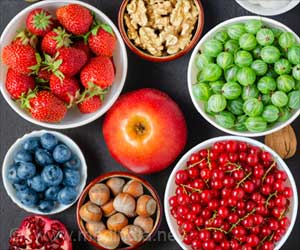
, tea, and wine. Earlier research has linked flavonoids to lower blood pressure and other markers of cardiovascular health.
Flavonoids have antioxidant and anti-inflammatory properties. After consumption, they are extensively metabolized by the gut microbiota and host tissues. There are six different types of flavonoids found in food, and each one is broken down in a different way.
Earlier studies have demonstrated the gut microbiota alteration by which flavonoids modulate anti-inflammatory function. So, including these foods in the diet will improve chronic diseases.
How Does Flavonoid Intake Impact Gut health and Blood Pressure Levels?
As gut microbiota is highly variable between individuals, and there are reported differences in gut microbial compositions among people with and without cardiovascular disease.
A new study examined the association between eating flavonoid-rich foods with blood pressure and gut microbiome diversity.
They also investigated how much variance within the gut microbiome could explain the link between intake of flavonoid-rich foods and blood pressure.
A group of 904 adults between the ages of 25 and 82 were recruited for this study. Researchers evaluated the participants’ food intake, gut microbiome, blood pressure levels, and clinical and molecular phenotyping at regular follow-up examinations.
Participants’ intake of flavonoid-rich foods during the previous year was calculated from a self-reported food questionnaire detailing the frequency and quantity eaten of 112 foods.
Flavonoid values were assigned to foods according to United States Department of Agriculture data on flavonoid content in food.
READ RELATED: Chapare Virus: Human-To-Human Transmission Of Deadly Ebola-like Virus Confirmed
Gut microbiome was assessed by fecal bacterial DNA extracted from stool samples. After an overnight fast, participants’ blood pressure levels were measured three times in three-minute intervals after an initial five-minute rest period
They also collected participants’ lifestyle information, including sex, age, smoking status, medication use and physical activity, as well as family history of coronary artery disease, the number of daily calories and fiber consumed, and each participant’s height and weight was measured to calculate BMI (body mass index).
Study Results
The analysis of regular flavonoid intake with gut microbiome and blood pressure levels found that:
- Participants who had the highest intake of flavonoid-rich foods, including berries, red wine, apples and pears, had lower systolic blood pressure levels, and greater diversity in their gut microbiome than the participants who consumed the lowest levels of flavonoid-rich foods.
- Up to 15.2% of the association between flavonoid-rich foods and systolic blood pressure could be explained by the diversity found in participants’ gut microbiome.
- Eating 1.6 servings of berries per day (one serving equals 80 grams, or 1 cup) was linked to an average reduction in systolic blood pressure levels of 4.1 mm Hg, and about 12% of the association was explained by gut microbiome factors.Drinking 2.8 glasses (125 ml of wine per glass) of red wine a week was associated with an average of 3.7 mm Hg lower systolic blood pressure level, of which 15% could be explained by the gut microbiome.
“Unlike many other food constituents, the flavonoids are predominantly metabolized in the gut — suggesting that the gut microbiome may be more important in enhancing their biological activity than for other things we eat,” says Dr. Cassidy, professor of nutrition and preventive medicine at the Institute for Global Food Security at Queen’s University in Belfast, Northern Ireland.
Limitations
The study participants were from the general population, and they were unaware of the hypothesis. However, residual or unmeasured confounding factors (such as other health conditions or genetics) can lead to bias.
Thus, these findings cannot prove a direct cause and effect, although the researchers did conduct a precise adjustment in their analyses for a wide range of diet and lifestyle factors.
They also noted the focus of this study was on specific foods rich in flavonoids, not all food and beverages with flavonoids.
Tips for Maintaining Healthy Blood Pressure
- Keep a healthy body weight
- Eat a diet rich in fruits, vegetables, and low-fat dairy products
- Cut down on sodium, or salt, in the diet
- Exercise regularly
- Moderate alcohol intake and avoid smoking
References :
- Impact of Gut Microbiome on Hypertensive Patients With Low-Salt Intake: Shika Study Results – (https://www.frontiersin.org/articles/10.3389/fmed.2020.00475/full)
- Hypertension – (https://www.ahajournals.org/doi/10.1161/HYPERTENSIONAHA.121.17441)
- Healthy gut, healthy heart? – (https://www.health.harvard.edu/heart-health/healthy-gut-healthy-heart)
Source: Medindia
Source:







